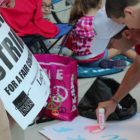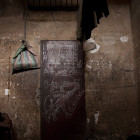

An 11-year-old denied making a threat and was allowed to return to school. Tennessee police arrested him anyway.
|
In late September, Torri was driving down the highway with her 11-year-old son Junior in the back seat when her phone started ringing.
It was the Hamilton County Sheriff’s deputy who worked at Junior’s middle school in Chattanooga, Tennessee. Deputy Arthur Richardson asked Torri where she was. She told him she was on the way to a family birthday dinner at LongHorn Steakhouse.
“He said, ‘Is Junior with you?’” Torri recalled.
Earlier that day, Junior had been accused by other students of making a threat against the school. When Torri had come to pick him up, she’d spoken with Richardson and with administrators, who’d told her he was allowed to return to class the next day. The principal had said she would carry out an investigation then. ProPublica and WPLN are using a nickname for Junior and not including Torri’s last name at the family’s request, to prevent him from being identifiable.
When Richardson called her in the car, Torri immediately felt uneasy. He didn’t say much before hanging up, and she thought about turning around to go home. But she kept driving. When they walked into the restaurant, Torri watched as Junior happily greeted his family.
Soon her phone rang again. It was the deputy. He said he was outside in the strip mall’s parking lot and needed to talk to Junior. Torri called Junior’s stepdad, Kevin Boyer, for extra support, putting him on speaker as she went outside to talk to Richardson. She left Junior with the family, wanting to protect her son for as long as she could ...

School-to-Jailhouse Pipeline Not Only in Mississippi
|
This story was produced in partnership with the Center for Public Integrity
Meridian is not alone under the DOJ magnifying glass. In a somewhat similar case in Tennessee, the DOJ says the Juvenile Court of Memphis and Shelby County has failed to inform children of the charges against them and of failing to make sure the children know what their legal rights are ahead of questioning. Like Meridian, the juvenile court is also accused of failing to hold timely hearings. There are varying definitions of a school-to-prison pipeline, said Jim Freeman, senior attorney at Advancement Project, a nonprofit legal action group that fights racial injustice. “How I like to define it,” Freeman said, “is the use of policies and practices that increase the likelihood that young people become incarcerated.”
That includes at-school arrests for minor behavioral incidents, as well as what he calls more indirect actions, like suspensions, expulsions or references to juvenile court or alternative schools.

Meridian Struggles with School-to-Prison Allegations
|
This story was produced in partnership with the Center for Public Integrity
Lionel Townsend will turn 14 in September and a few months after that he will be able to return to school, ending a year of exile. Lionel admits he got into fights multiple times at Magnolia Middle School. When he was charged with vandalizing a school bus security camera, he was booted from school. He fought again in a community day program. The county Youth Court eventually put him on probation and an order to stay at home with an ankle monitor.

Repairing the Damage of Conflicts with Community Conferences
|
There is that moment after a conflict, maybe it’s an argument or some harsh words, when we want to reconnect with the other person, but we don’t know exactly how. We are embarrassed sometimes, or maybe afraid to be rejected or hurt again. Maybe we are in pain or ashamed, but we want to repair the relationship. We desire to move forward. This impulse is at the heart of restorative justice, and it occurs in conflicts large and small.

Juvenile-involved Murder Rate Holds Steady
|
Youths are involved in murders, either as victims or perpetrators, at about the same rate as they have been for the last few years, according to newly gathered statistics. Both figures are far down from an early 1990s peak. In 1994, juveniles were involved in committing more than 2,300 murders. The year before that, nearly 3,000 minors were murder victims.
In 2010, the statistics had fallen to 788 and 948 respectively, according to data recently published by the federal Office of Juvenile Justice and Delinquency Prevention, which complies figures voluntarily reported by many jurisdictions nationwide, including the largest urban areas in the country. For the past decade, neither number has gone above 1,100.

A Day Off Or A Day To Make A Point? Student and Teacher Voices At Chicago Strike
|
As Chicago’s teacher strike heads into its fourth day, with more than 350,000 students out of school, parents scrambling to find alternatives and presidential election pressures weighing on both sides, Mayor Rahm Emanuel and union leaders are under great pressure to find a solution. Much movement in the talks was cited late Wednesday by both sides – with some hope of classes resuming Friday. But for Thursday, it was expected to be another missed school day filled with passion and protest as teachers and the administration press their cases to a public eager to see the strike end and the children back in their seats. Both sides claim to be acting in the students’ best interests, but sometimes the young voices of CPS students are left out of the public debate. We spoke with three students from Northside College Prep who joined their teachers at the CPS strike and express support for the CTU’s cause, saying this strike is “all about us (students) in the first place.”
Meanwhile, at Curie High School, a mix of teacher and student voices hoping to be heard on class size, the need for more counselors and respect for the 29,000 CTU workers who have walked out and are striking Mayor Rahm Emanuel and his schools team as a nation looks on – perhaps to see what direction school reform is headed.

Families Unlocking Futures: Solutions to the Crisis in Juvenile Justice
|
In 2001, my 13-year-old son, Corey, was sent to what the New York Times called “the worst juvenile prison in the country.”
What crime had he committed that earned him this hellish journey to the Tallulah Correctional Center for Youth in Louisiana? He stole a $300 stereo out of pick up after he smashed out the window with a crowbar. His sentence was five years in one of the most brutal facilities in the United States. The families of children who are system involved are often thought of as lazy, uneducated, uncaring or worse. But a new report by Justice for Families (J4F) gives us a much different picture of families and relies on substantial data rather than outdated myths and stereotypes.



